Samir Raafat
EGYPTIAN MAIL, April 2, 1994
this article appears in "The Egyptian Bourse" published by Zeitouna 2010
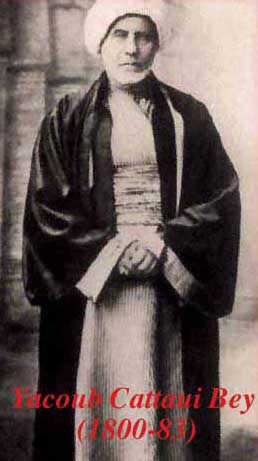
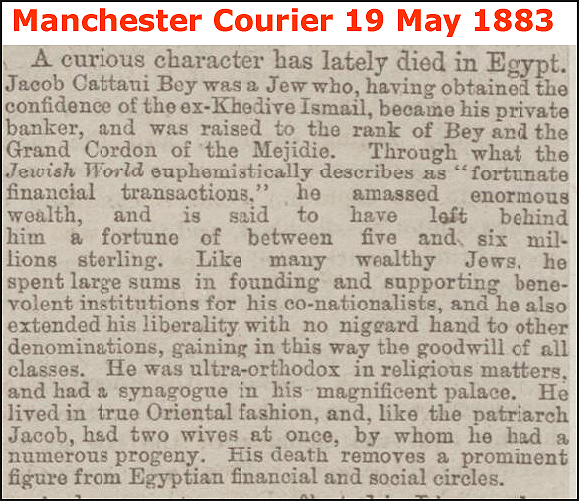
|
|
|
|
|
|
EGY.COM - JUDAICA
|
|
Samir Raafat
EGYPTIAN MAIL, April 2, 1994
this article appears in "The Egyptian Bourse" published by Zeitouna 2010


ON DECEMBER 21, 1950 a landmark auction took place in a large neo-Gothic villa at No. 8 Ibrahim Pasha Naguib Street, Garden City. One of the social and intellectual highlights of the season, the event consisted of auctioning off the extraordinary library of Senator Joseph Aslan Cattaui Pasha (author of Coup d'oeil sur la chronologie de la nation Egyptienne, Plon, Paris, 1931) now dead for almost nine years. Cairo's primo auctioneer, Maurice George Lee (formerly Levi) presided over the occasion with the able assistance of rare books expert I. Feldman who had come over especially from Europe.
As priceless books and volumes were finding new homes, the auction signaled the closing of another colonial chapter in Egypt's modern history and the going off stage of one of Cairo's most powerful Jewish families.
Here's their story, which started over one hundred and fifty years ago.
IN THE WAKE of Egypt's modernization, which started, with the reign of Mohammed Ali Pasha (r.1805-48), vast fortunes were conceived in the form of trading houses, banks and real estate empires. How, and the way in which they did it, shaped the lives of certain families into the great dynasties they became.
One such clan was the Cattauis. From master of the mint under Viceroy Abbas Hilmi I and saraf bashi under Viceroy Said to minister of transport and finance under King Fouad, the Cattauis, a deep rooted family of oriental Jews from Egypt, held a most privileged place in the country's politics, commerce and society such as few other families in contemporary Egyptian history. Banking and real estate, formed the basis of their dynastic fortune. Their power and prestige lasted unchallenged well through the first quarter of the present century.
The founder of the dynasty, Yacoub Cattaui Bey (1800-83), was a senior administrator in the Egyptian government and a confidant of viceroys and khedives. He lived in opulent splendor in the fashionable district of Shubra where successive rulers set up residence. Yet, by the time he passed away, the seat of power had already shifted to the area of Abdin and the new Cairo district of Ismailia, so named after its promoter, Khedive Ismail Pasha.
Yacoub Cattaui's progeny was large with two of his four sons, plus a grandson, attaining the distinguished rank of pasha. As for his daughters and granddaughters, they contracted dynastic marriages with other leading Jewish merchant families in Egypt, thus assuring the predominance of the House of Cattaui.
Moise (sometimes called Moussa or Maurice depending on circumstances), was the founder's youngest son. He carried the Ottoman title of pasha as well as a hereditary Hungarian knighthood hence the appendage 'de' in his branch of the family. Like his father before him, Moise made several contributions towards the enhancement of Austrian influence in Egypt thus assuring himself the continued support of a very appreciative European sovereign and protector.
Several Cattaui descendants served in the Egyptian civil service whether as cabinet ministers and senators or, alternately, as deputies from the Upper Egyptian district of Kom-Ombo where the Cattauis held significant interests in the sugar industry.
There were also Cattaui architects, lawyers, poets, musicians and diplomats. One of the latter, George Cattaui, was invariably the Chargé in the choice post of London, Paris and Washington. There were also those who spent their time in the pursuit of philanthropy and pleasure as well as the odd man out who broke with family ranks by converting to Catholicism, ultimately becoming a prince of the church.
And there were also the presidents of Egypt's thriving Jewish community.
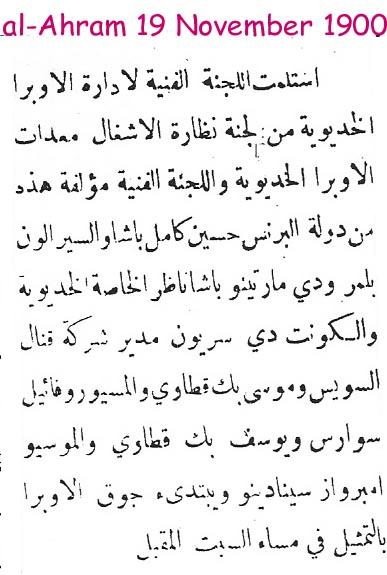
As for the Cattaui women, they were the leaders and arbitrators of the social scene. They attended glittering court balls, opera premieres and countless charity bazaars. In stark contrast to the traditionally minded Egyptian upper class women, most of whom were never seen in public, early this century the Cattaui consorts were becoming an integral part of Cairo and Alexandria's cosmopolitan societies enhanced by their European education and their emancipated upbringing.
It is no wonder the Cattaui ladies were seen at all the important premiers for it was their husbands who at one time ran the opera's artistic committee. Al-Ahram of 19 November 1900 lists the committee members as: Prince Hussein Kamel (future sultan of Egypt); Sir Elwin Palmer of the National Bank of Egypt; De Martino Pasha, head of the Privy Council; Comte de Serionne director of the Suez Canal Company; Moussa Cattaui Bey, Monsieur Raphael Suares, Youssef cattaui Bey and Monsieur Ambrosio Sinadino.
At court several Cattaui relations played important roles. Diplomat-author George Adolphe Cattaui was King Fouad's speechwriter. The wife of Joseph Aslan Cattaui Pasha reigned supreme yielding more influence amongst the courtiers than the queen herself. Known as "Madame Cattaui Pasha" the Grande dame of the royal court was born Alice Suares daughter of real estate mogul Joseph M. Suares.
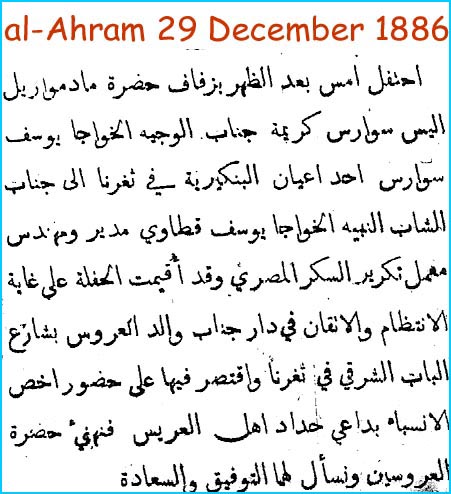
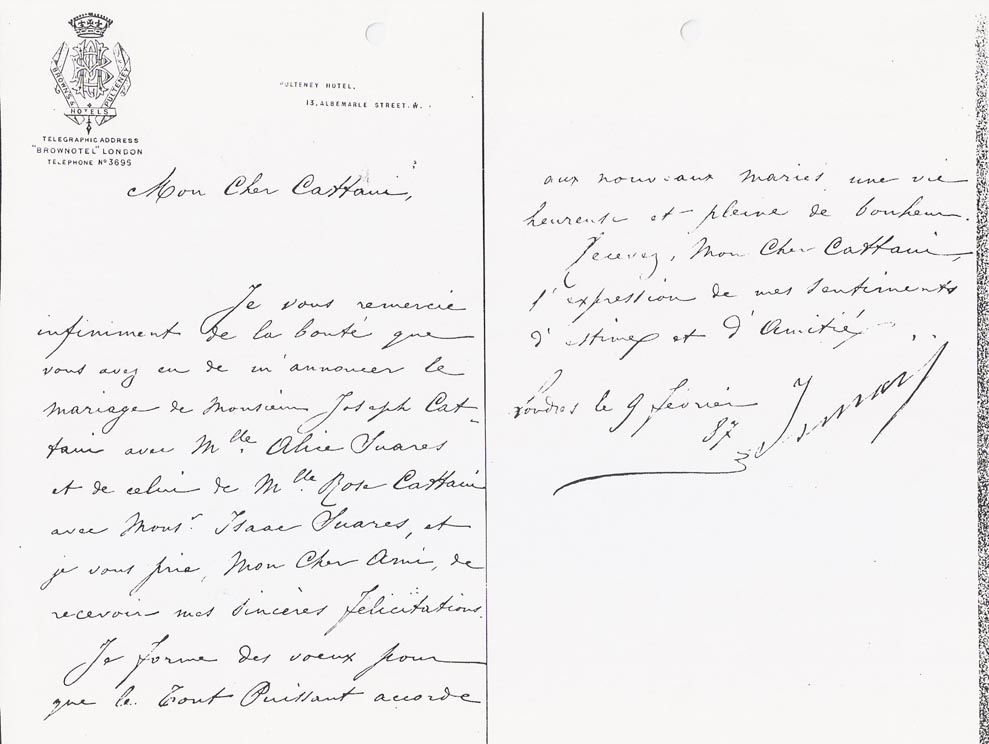
Madame Cattaui Pasha had replaced her late cousin Valentine as first lady-in-waiting to the queen. A daughter of railway baron Felix Suares, through her mother Valentine was the great granddaughter of the founder of the Cattaui dynasty. Her connection to court could have come from her husband Robert Simon Rolo (later Sir Robert), the private financial advisor to King Fouad. An heir of a rich merchant house with branches in Cairo, Alexandria, Liverpool and Manchester Rolo and his Anglophile kin were involved in the Manchester and colonial trade evolving into the owners of a powerful a private bank.
The Cattauis, the Rolos, the Suares and their millionaire relation Elie Mosseri Bey (son of Elena Yacoub Cattaui,), nicknamed 'Lord Elie' by his family invested heavily in real estate. They foresaw the unparalleled growth of Cairo and the lucrative effect such expansion would have on land values. It is not surprising then, that their separate private residences were located at the nexus of the elegant European quarter of Ismailia and later in the choicest parts of Kasr al-Dubara, Garden City, Zamalek and Giza.
For instance, the Moise Cattaui residence on Cherifein Street (No. 4) was situated in the middle of a large garden overlooking what we know today as Talaat Harb Square.
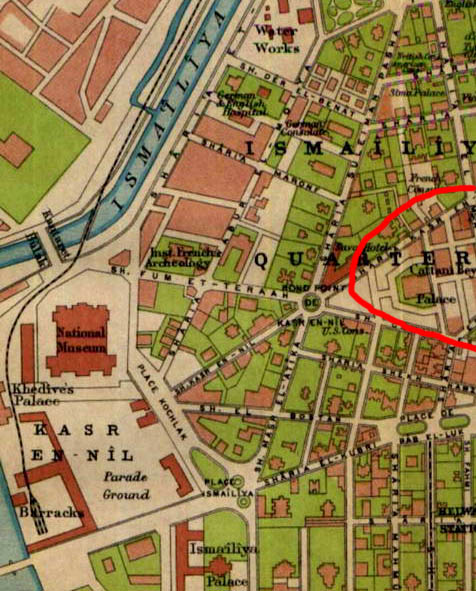
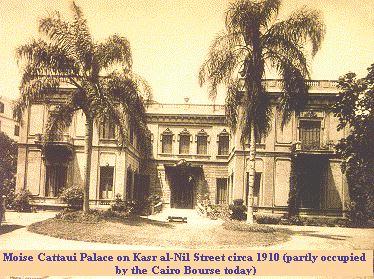
In its early days, Kasr al-Nil Street was often referred to as Rue Cattaui. In fact this section of Cairo boasted two Cattauis streets: Rue Cattaui and Rue Moise Cattaui Pasha. There were Cattaui streets in other parts of Cairo as well such as the Cattaui Street that ran from Midan Khazindar to Sharia Rouei, and the Moussa Cattaui Bey Street in Abbassia.
Julius Franz Pasha built the original downtown Moise de Cattaui Pasha palace No. 23 on Kasr al-Nil Street. A large garden and an equally large pond surrounded it. The house was redesigned in 1907 by the architecture firm of (Maurice) Cattaui & Edward Matasek to make way for a much larger residence.
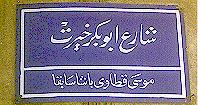
Come to pay their respects were a large number of dignitaries both foreign and Egyptian. Apart from the King's representative, present at the funeral were incumbent prime-minister Saad Zaghloul Pasha accompanied by two former head of governments: Adly Yegen Pasha and Tewfik Nessim Pasha.
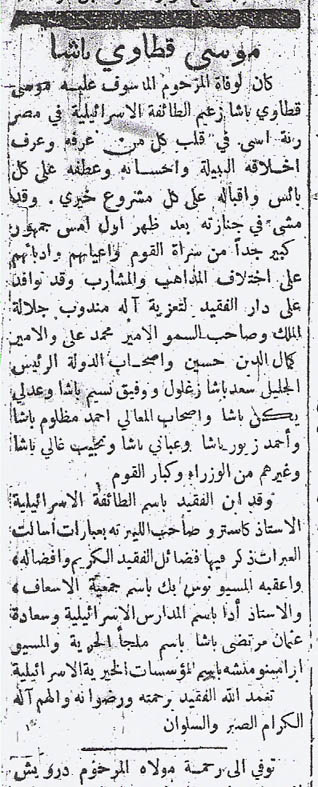
19 May 1924 obituary of Moussa Cattaui Pasha in al-Ahram
Also present were the president of the Chamber Ahmed Mazloum Pasha and [future prime minister] Ahmed Ziwar Pasha. From the ruling house were Princes Mohammed-Ali Tewfik [brother of the former Khedive of Egypt] and Kamal al-Din Hussein [son of the late Sultan of Egypt].
Eulogies were read by publisher Leon Castro, Mr. Henri Naus Bey director of the Sugar Company, Mr. Adda chairman of the Ecoles Israelites, Osman Murtada Pasha former governor of Alexandria and Mr. Abramino Menasha head of a variety of Jewish charity organizations.
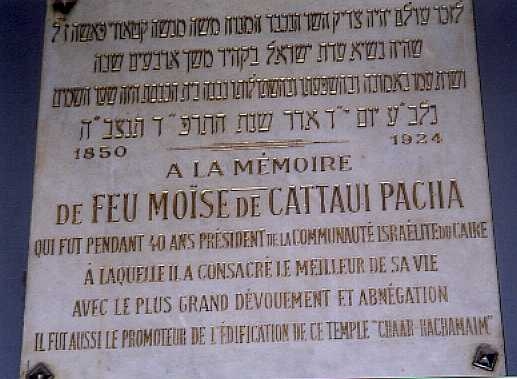
In 1927, the Cattaui's Kasr al-Nil property was sold and the house torn down to make way for a collection of buildings foremost among them is the Shell Building and the Cairo Bourse.The section of the garden facing Midan Soliman Pasha (later, Talaat Harb) was also sacrificed to commercial development. It is there where the Sednaoui building, built by Giuseppe Mazza, was constructed.
To the south of the large Moise Cattaui townhouse stood the houses and offices of other Cattaui relations such as the marble villa next to No.33 Kasr al-Nil Street belonging to Youssef Yacoub Cattaui Pasha and his wife Bida Eliahou Israel herself a daughter and granddaughter of Cairo and Jerusalem's 19th century grand rabbis.
Maadi resident Vera Rabinovitch, who celebrates her 85th birthday this year, is a great-granddaughter of Youssef Cattaui Pasha through his daughter Rachel Cattaui (Mrs. Teophile Elia Rossi). She remembers (see Cairo Today, October 1983) when her branch of the Cattaui clan gathered together to witness the arrival of the sultan followed by Lord Allenby as they headed a military parade which included over flying Handley Page airplanes. This was in commemoration of Britain's victory over the Turks in Palestine. Allenby would eventually become British High Commissioner and Egypt's de-facto ruler during the Protectorate years.
After the death of Bida Israel Cattaui in June 1922, the house was pulled down and what remained of the garden with its royal palms and red gravel paths was taken over by Sault's, then a favorite tearoom and café-restaurant.
To the south of the Cattaui Kasr al Nil residences stood the Risotto Building and other properties belonging to the Suares relations hence the name of Rondpoint Suares (later, Midan Mustafa Kamel).
Further north, towards Avenue Fouad (today 26th of July Street) lived Nessim Mosseri with his wife Elena Yacoub Cattaui. Their residence occupied almost an entire block fronting today's 26 of July and Mohammed Farid Streets. It is said the Mosseris donated part of their garden for the construction of the Ismailia Synagogue on Magrabi (now Adly) Street. The synagogue, which was designed by Cattaui & Matasek, was the scene of many Cattaui weddings and funerals. It is also there that Moise Cattaui Pasha sustained a serious shoulder injury while inspecting the damages that resulted from the accidental fire that took place in April 1922. As for the Nessim Mosseri house, it became Cairo's first museum of modern art.
Another Cattaui residence worth mentioning Youssef Aslan Cattaui Pasha's turreted neo-Gothic villa attributed to architects Matasek and Cattaui. Contiguous to the palace of Princess Nimet Kamal Al Dine (daughter of Khedive Tewfik Pasha) in the east, the villa stood at the eastern entrance of Kasr Al Nil Bridge. When Joseph Cattaui moved to his newly commissioned neo-Gothic villa in Garden City circa 1920, the older villa was purchased by Kout al-Kouloub al-Demerdashia. In the 1960s it was torn down to make way for a circular ramp/access road leading on to Kasr al-Nil Bridge.
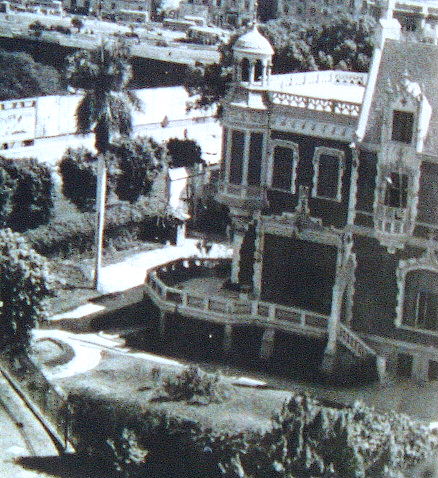
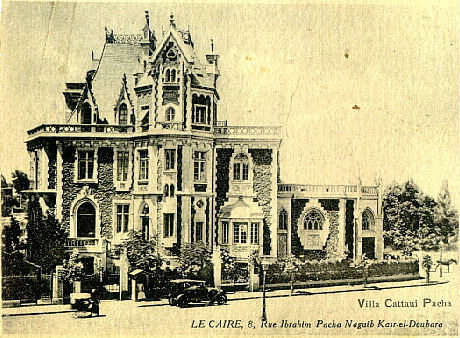
The palatial Cattaui homes were centers of entertainment and hospitality. A Cattaui wedding inevitably led to traffic congestion while the death of one or the other of Yacoub Cattaui's male descendants led to the closure of the Cairo or Alexandria Bourse.
In Charles Didier's book Les Nuits du Caire, (1860), we learn of a brit mila, or circumcision fete that took place at Kasr Al Nozha, the Cattaui palace in Shubra. The eight-day old boy was Yacoub Cattaui's youngest son, Moise. According to Didier, everyone was in native dress and since no one knew French save for a very few, the conversation amongst the invited notables was conducted in either Turkish or Arabic. We also learn that women were nowhere in sight. As customary, they were celebrating in another quarter of the opulent palace entertained by the diva of the day, the Oriental singer Sakna and her accompanying 'tar' or drum.
When the Earl of Dufferin, the British Ambassador to the Sublime Porte in Constantinople, visited Egypt in 1882, he stayed in the Cattaui palace. This was the ultimate honor for the host since Egypt at the time was still an Ottoman province.
Twenty-six years after his circumcision, it was the turn for Moise's newly born son, Gustave, to undergo the same kind of ceremony. Present at these celebrations was Khedive Ismail himself. The difference this time was that the festivities were attended by both sexes and that in the course of one generation, the language of conversation had shifted from Arabic to French. The irreversible Europeanization of the Cattauis and a whole generation of Cairo's Levantine community, had begun thanks to the Paris-based Alliance Israelite Universelle and to French cultural imperialism that had so imbued Egypt at the end of the 19th century.
Even before Moise married his European wife Ida Rossi, French had not only displaced Italian in the Mixed Courts, but had also become the lingua franca of the entire business community.
To fathom the scale of entertainment that went on at the Cattaui homes, one refers to the May 28, 1909 edition of Le Progrés, which illustrates in detail the 11-course dinner offered by Moise and Ida Cattaui when entertaining the visiting Austrian Minister. The guests were limited to 16 however because Ida was in mourning over the loss of her father, Elia Rossi Bey, the former doctor of the khedivial court and author of the book La Nubia e il Sudan. His French-language obituary in L'univers Israelite P. 298 reads as follows:
L'Institut Egyptien et quarante-cinq Academies europeennes viennent de perdre un de leurs members les plus illustres qui, pendant cinquante ans, n'a cesse d'enrichir les sciences et les lettres de ses remarquables travaux.
Le docteur Elie Rossi-Bey est ne en 1816 a Ferrare (Italie) ou il etudia la medecine. A l'age de vingt-huit ans, il vint en egypte, ou il s'allia a une des plus honorables familles du Caire. C'est le premier Israelite qui ait obtenu le grade de Bey en Orient, et le seul qui ait pu visiter les villes saintes de l'Islam, la Mecque et Medine. Le grand Mehemet-Ali, chef de la dynastie actuelle, ses fils Said et Halim et ses petis-fils Abbas et Ismail, ont tous temoigne estime et affection au defunt et lui ont confie les missions scientifiques les plus importantes. Mais ce ne sont pas seulment les vice-rois d'egypte qui ont honore de leur haute bienveillance l'eminent docteur, le savant eclaire et l'aimable poete: Victor Emmanuel, le roi galantuomo, apprecia ses merites et lui accorda les permiers distinctions honorifques de l'Italie.
Pendant sa longue carriere medicale, il n'a jamais deserte son poste, alors meme que la peste infestait le pays. Il a toujours traite avec egale sollicitude ses clients riches et pauvres, sans distinctions de race ni de culte; aussi l'eternel lui a-t-il accordé la joie de voir ses filles et ses files allies aux grandes familles du pays, telles que les Cattaui, les Chalom, les Green, les Viterbo, les Musseri, etc., etc., tous occupants des positions éminentes.
Que dieu renpande le tresor de ses consolations sur la noble familles d'Elie Rossi-Bey et accueille parmi ses elus, dans le ciel, l'ame pure de ce mort illustre! Il y priera encore pour la grandeur et la gloire d'Israel et pour le bonheur de son peuple.
From the Egyptian Gazette (1905) we note that Moise de Cattaui Pasha's extensive real estate holdings included the 6,000 square meters of Nile frontage in the fashionable district of Kasr al-Dubara. He sold it to the Swiss hotelier Mr. Bucher-Durrer for five pounds sterling a square meter so that the latter could erect his Edwardian-style Semiramis Hotel (today replaced by the Semiramis-Intercontinental).
To the southeast of the Semiramis Hotel were several stately villas belonging to Cattaui relations. One of these villas belonged to Sir Robert Rolo. In the 1950s it became the (USIA) American Embassy Library before it was destroyed by fire. Today the land on which it stood forms an integral part of the fort-like American Embassy compound .
One of the more prominent and mediatized members of his family, Joseph Aslan Cattaui Pasha started off as an engineer after completing his studies in the Ecole Central in France in 1882. Upon returning to Egypt he worked in the ministry of public works where he participated in a competition for the design of the Alexandria Railway Station. He then joined the administration of the sugar factories in Upper Egypt belonging to his Suares relations. It was with that purpose in mind that he traveled to Moravia to learn about sugar refining.
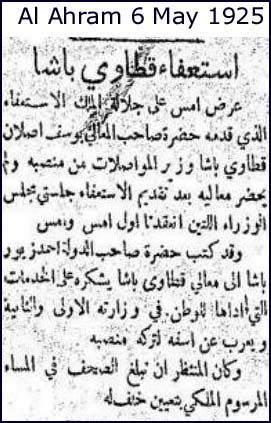

With time Joseph Cattaui Pasha became a director of both the Sucreries d'Egypte and the Kom-Ombo Sugar Company. He also joined Egypt's 33rd government headed by Ahmed Ziwar Pasha in November 1924 and then again in the 34th government of March 1926. In 1927 King Fouad appointed him to the senate.
Between 1924 and 1942 Joseph Cattaui Pasha was president of the Sephardi Jewish council of Cairo a post, which heretofore had been occupied by his uncle, Moise Cattaui Pasha. A self-declared anti-Zionist, Youssef Pasha stood firm on the issue, which made him unpopular with some of the more radical elements within his community.
Upon Joseph Pasha's death, his son René took over the presidency of the Jewish Community until his induced resignation 1946. For the first time in almost half a century, a Cattaui was no longer in control despite his lineage and strong boardroom connections.
René's daughter, Nimet, had married George, the only son of Emanuel Mizrahi Pasha, the king's lawyer. The wedding took place at Joseph Cattauis Pasha's house (where the famous book auction took place in 1950).
Aside from their handsome residences, the Cattauis owned large chunks of real estate in and around Cairo. Among them is Les Halles or indoor marketplace on Midan Falaki, Bab al-Louk that was built in 1911 on newly acquired Cattaui property. Joseph and Adolphe Cattaui owned the Societé des Halles Centrales d'Egypte.
In the district of Abbassia, the Cattauis owned masses of property, possibly acquired when Yacoub Cattaui Bey was master of the mint to Abbas I. It was from this land that Yacoub donated a sizable plot to the Austro-Hungarian community in 1881 for the erection of the first Crown-Prince Rudolf Hospital. Although the hospital was inaugurated on December 2, 1888 on the occasion of Franz Josef's 40th anniversary as Emperor of Austria, it would be 23 years later before Moise Yacoub Cattaui Pasha, president of the Austro-Hungarian colony since 1906, received his Hungarian letters of nobility entitling him to the appendage of "de" to his name: henceforth known as Moise de Cattaui.
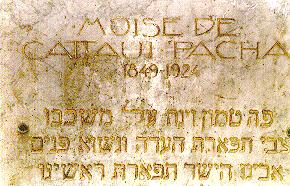
The Israelite school, which opened in 1920 near Fagallah on Sakakini Street, was named after its benefactor, Moise de Cattaui Pasha. A decade earlier, on May 20, 1909, Moise Cattaui had inaugurated another Israelite school, this time situated on Hassan al-Akbar street, opposite the Khedivial Law School.
In 1927, the large Israelite school of Abbassia was inaugurated not far from the former Rudolf Hospital thanks to generous donations from Joseph Aslan Cattaui Pasha and other members of the Jewish community.
A landmark villa that was built by the de Cattauis is No.15 Mohammed Mazhar Street (ex-Rue Rosi) in Zamalek. It was the heirs of Moise Cattaui who sold it in 1942 for the sum of approx. LE 14,000 to Princess Samiha, daughter of the late Sultan Hussein Kamel. It is also there that stockbroker-poet Edmond Jabes celebrated his marriage to Moise Cattaui's granddaughter, Arlette Cohen, circa 1937. Several years after the death of Princess Samiha, who, incidentally, was also a poet, the house was transformed into the Greater Cairo Library scheduled for inauguration first lady Mrs. Suzanne Mubarak in 1995.
In Giza, the Cattaui-Mosseri-owned Cairo Land & Financial Company acquired the palace and the adjacent property belonging to Sultan Hussein Kamel. It is there that several Cattaui-Mosseris built their mansions when they moved out of downtown Cairo. One of the remaining villas belongs today to the Russian Embassy. Another one (behind the Russian Embassy), once the property of Victor Mosseri, became a government school still recognizable for its gargoyles and other Victorian follies.
 There was the Alexandria branch as well. Its patriarch, Baron Jacques Bohor Yacoub Levi de Menashe was the son of Semha, Yacoub Cattaui's eldest daughter. The Menashes were amongst the first to take advantage of the blanket protection given to the Jews of that city in 1854 by Austria's monarch. Having caught Emperor Franz Josef's attention during the Suez Canal inaugural celebrations of 1869, Yacoub Levi Menashe, an Alexandria merchant claiming ancestry in Central Europe, was ennobled by the Austrian Emperor in October 1873. Two years later, the honor was upgraded to the hereditary title of Hungarian Baron. Alexandria's colorful aristocracy thus welcomed yet another nobleman among its inflated ranks. Like their Cattaui cousins in Cairo, the Menashes were the leaders of the Jewish community residing in Egypt's maritime capital.
There was the Alexandria branch as well. Its patriarch, Baron Jacques Bohor Yacoub Levi de Menashe was the son of Semha, Yacoub Cattaui's eldest daughter. The Menashes were amongst the first to take advantage of the blanket protection given to the Jews of that city in 1854 by Austria's monarch. Having caught Emperor Franz Josef's attention during the Suez Canal inaugural celebrations of 1869, Yacoub Levi Menashe, an Alexandria merchant claiming ancestry in Central Europe, was ennobled by the Austrian Emperor in October 1873. Two years later, the honor was upgraded to the hereditary title of Hungarian Baron. Alexandria's colorful aristocracy thus welcomed yet another nobleman among its inflated ranks. Like their Cattaui cousins in Cairo, the Menashes were the leaders of the Jewish community residing in Egypt's maritime capital.
At the turn of the century the name Menashe was synonymous of power, wealth and arts. The Menashe legacy in Alexandria is abundant starting with the Menashe gallery, which faces Mohammed Ali Square (ex-Place des Consuls), the Menashe Schools, the Menashe hospitals and the Menashe temples. There were also the great Menashe houses, the Menashe immeubles de rapport and the Rue Menashe.
In 1904, the Cattauis and the Menashes, together with two influential British financial advisors to the Egyptian government-Sir Auckland Colvin and Sir Elwin Palmer-formed the Egyptian Delta Land & Investment Company which created in 1907 the suburb of Maadi along the Bab al-Louk - Helwan railway line which belonged to a consortium led by Jacob Cattaui's son-in-law, Felix Suares.
Delta Land Co was but one of several urban and agricultural venture capital companies owned by the same business elite made up of Cattauis, Suares, Menashes and Rolos. Later, Elie Mosseri Bey (grandson of Yacoub Cattaui) whose accumulated wealth made him the undisputed first among equals, would join the conclave.
The founding fathers and early directors of the National Bank of Egypt, which opened in June 1898, included a Cattaui (Moise Pasha) a Menashe (Baron Jacques) two Rolos (Jacob and Sir Robert) and three Suares (Felix, Raphael and Leon). These gentlemen were either descendants of Yacoub Cattaui or related to him by marriage. But even before the National Bank was created, the Cattaui dynasty were directors of several banks and companies in Egypt, a position they retained well into the 1930s.
The Cattauis also had large banking and business dealings in Europe, notably Paris. Leafing through leading Parisian newspapers dated the first half of (February) 1903, one learns of a famous libel suit at the Palais de Justice brought against the celebrated Humberts-Daurignacs of Paris by the "well-known Egyptian banker Monsieur Cattaui whom Madame Frederic Humbert had accused of usury."
Madame Humbert was the daughter-in-law of Auguste Humbert, the former French minister of Justice. The charges she brought against Monsieur Cattaui were not very favorable to the latter's business reputation. "For me, Cattaui and his son-in-law Mr. Reitlinger, have certainly been the biggest and most terrible usurers who have ever crossed my path. Cattaui was always inexorable, always trying to bleed me for money with his fantastic rates of interests reaching between 300 and 400 per cent." Strong accusation against the 1886 recipient of the French Legion d'Honneur for services rendered to the French residents in Egypt.
The ensuing court case was among the most notorious of the decade.
The process of gentrification and westernization of the Cattauis, which started in the heyday of Khedive Ismail's reign, was completed with the arrival of Moise de Cattaui Pasha and his generation. By that time the European powers had carved up what remained of the vast Ottoman Empire taking full advantage of the latter's profitable regime of capitulations or concessions.
During the heyday of the Britain's almost 75-year occupation of Egypt, the Cattauis and their relations had become the fulcrum of Egypt's business world. But as is usual with third and fourth generations in comparable dynasties, the Cattaui wealth slowly dissipated through squandering, bad investments, inheritance and taxes. More importantly the economic and political climate had changed and fierce competition appeared from new and different quarters. The less motivated Cattaui heirs had come of age and taken over. They lacked the drive, hunger and cutting edge that had made their parents and grandparents such great achievers..
Today, the Cattauis are no longer super-rich or omnipotent, just well heeled citizens leading contented lives. Out of Yacoub Cattaui's many descendants, less than a handful can be found in Egypt; these have adapted well and not so well to changing times. The rest are scattered around the world either as diplomats in European chancelleries, country squires in Scotland, financiers in Geneva or, alternately as auctioneers in New York. There are also the pensioners in Lausane, the poets in Paris and the artists in Marseille. One of them, Henri Cohen, a grandson of Moise Cattaui, still imports cotton from Egypt.
The two last Cattaui patriarchs-Beys-MP Aslan and Senator Rene Joseph Cattaui-are buried in Switzerland. The first has Egypt's pre-1954 flag (crescent and three stars) engraved on his tomb and reportedly was buried a Catholic. His brother died in Lausane age 97 a forgotten man. His modest obituary in al-Ahram (10/09/94) referred to him simply as "René Joseph Cattaui Bey, former Egyptian senator." None of the usual accolades once attributed to his famed forebears. (Note: Rene Cattaui became senator when his father Joseph Cattaui Pasha resigned for health reasons on 20 July 1938)
The spirit of this important dynasty is no more. It is as though it passed into the back pages of history, a ghost for what had once stood for riches, glamour and power.
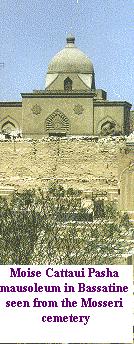
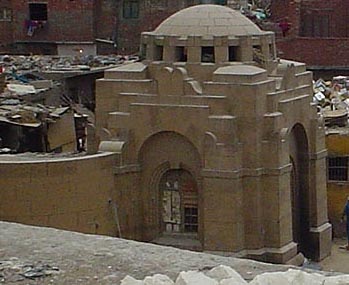
|
Reader Comments |
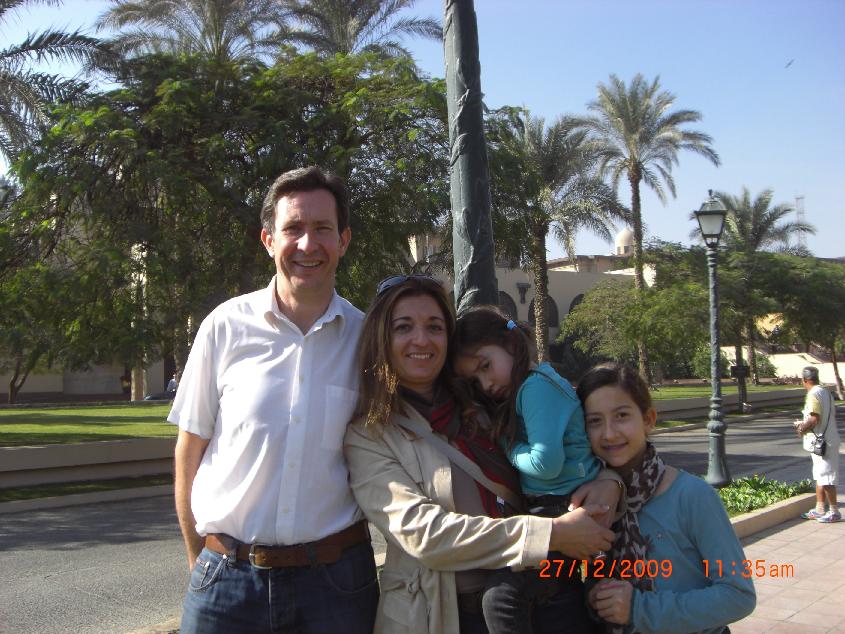 Visit of Patrice R. Cattaui and his family--Natalie, Deborah and Joana to Cairo's Mena House Hotel
Subject: Cattaui
|
|
|
|
|